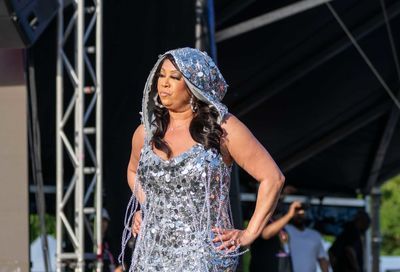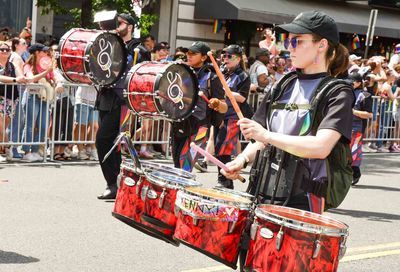Justice Department will help trans student fight Florida’s anti-trans bathroom ban
A federal appeals court is slated to decide whether a transgender boy barred from male restrooms had his civil rights violated.

The U.S. Department of Justice will argue on behalf of a former transgender high school student who challenged his local school district’s policy prohibiting transgender students from using bathrooms that match their gender identity.
Drew Adams, an alumnus of Nease High School in St. Johns County, Florida, filed a lawsuit in 2017 after school officials forced him to use a gender-neutral, single stall bathroom or the girls’ bathroom, despite having previously used the boys’ bathroom without incident during his freshman year.
A federal judge found that the school district unlawfully discriminated against Adams when it barred him from using the boys’ bathroom, finding that he “pose[d] no threat to the privacy or safety of his fellow students by using the bathroom that matches his gender identity.
The St. Johns County School Board appealed the lower court’s decision to the 11th U.S. Circuit Court of Appeals, which upheld the lower court’s decision by a 2-1 vote, finding that the school district had discriminated against Adams under both the Equal Protection Clause of the Fourteenth Amendment and Title IX of the Education Amendments Act of 1972, which prohibits sex-based discrimination in educational settings.
The school board subsequently requested an “en banc” hearing, in which all the judges on the 11th Circuit would rehear the case. In an effort to persuade their fellow jurists from rehearing the case, the two judges in the majority issued a revised opinion, in which they found that the bathroom policy violated Adams’ right to equal protection, but not his rights under Title IX.
But the full circuit eventually decided to rehear the case regardless, potentially setting up a situation where the conservative appeals court might rule that the school district was well within its rights to bar Adams from the boys’ bathroom. That would create a “split in the circuits,” in which at least two other circuit courts — the 4th and the 7th — have previously ruled that barring transgender students from using bathrooms matching their gender identities is a form of sex-based discrimination.
That, in turn, could potentially prompt the U.S. Supreme Court, which declined to hear an appeal in a similar case out of Virginia last year, to take up Adams’ case and determine definitively whether Title IX’s protections against discrimination extend to transgender students.
Several states have since taken sides in the case, with attorneys general from 22 states and the District of Columbia — all Democrats — signing onto an amicus brief in support of Adams’ contention, while 18 other states with Republican attorneys general siding with the school board, arguing that allowing people to use facilities that do not match their biological sex at birth infringes on the privacy of cisgender students who may be discomforted by sharing facilities with their transgender peers.
Recognizing the importance of the case, the U.S. Department of Justice submitting a motion earlier this month requesting the right to argue in Adams’ favor, alleging that the school board’s policy was doubly discriminatory, both on the basis of equal protection and on the basis of sex. That motion was approved by the 11th Circuit last week, reports the News Service of Florida.
“The board fails to identify any sound basis for treating Adams differently than cisgender boys for purposes of using the school restrooms, even while treating him as a boy for other purposes,” the Justice Department argued in a brief filed in November. “…Even if Adams has some anatomical differences from cisgender boys, those differences are not observable when Adams goes into a private bathroom stall and closes the door. To justify differential treatment, the differences must actually be relevant to the government’s [the school board’s] asserted justification.”
Support Metro Weekly’s Journalism
These are challenging times for news organizations. And yet it’s crucial we stay active and provide vital resources and information to both our local readers and the world. So won’t you please take a moment and consider supporting Metro Weekly with a membership? For as little as $5 a month, you can help ensure Metro Weekly magazine and MetroWeekly.com remain free, viable resources as we provide the best, most diverse, culturally-resonant LGBTQ coverage in both the D.C. region and around the world. Memberships come with exclusive perks and discounts, your own personal digital delivery of each week’s magazine (and an archive), access to our Member's Lounge when it launches this fall, and exclusive members-only items like Metro Weekly Membership Mugs and Tote Bags! Check out all our membership levels here and please join us today!



































You must be logged in to post a comment.